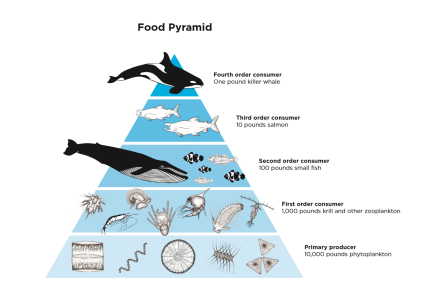No matter where you live, the ocean touches your life every day. Oceans generate half of the oxygen we breathe and contain more than 97% of the world's water. Whether you live on the coast or far from it, whether you eat seafood or not, you and the future of all those you love depends on healthy oceans.
Materials
- Food web cards (PDF) (Courtesy of NOAA)
- Ocean food pyramid (PDF) (Courtesy of Seattle Aquarium)
- Who eats whom in Puget Sound (PDF) (Courtesy of Seattle Aquarium)
- Protect our ocean activity book (PDF) (Courtesy of NOAA)
Watch this 10-minute Ted Talk video, "Protect the Oceans, Protect Ourselves".
Forage fish and food webs
Forage fish are small, schooling species that eat microscopic plants and animals drifting near the ocean surface and are eaten by bigger fish, seabirds, and marine mammals. Common forage fish are sardines, herring, and anchovies. Find out why forage fish and juvenile salmon depend on eelgrass and bull kelp in an interactive, 360-degree experience courtesy of Friends of the San Juans.
Watch this 5-minute video from WDFW habitat biologist Lindsey Desmul to learn why Puget Sound beaches are important to forage fish.
Activity: Create a Salish Sea food web
Learn about the different organisms that live in the Salish Sea and how they are all connected.
Gather your materials

- Set of food web cards (PDF)
- Large sheet of paper
- Scissors
- Glue stick
- Colored pencils or markers
Instructions
- Cut out your food web cards and start arranging the cards into food chains/webs. The back of the cards has information to help you determine what eats what. You can also use the printable materials from the Seattle Aquarium to help.
- Once you have cards organized, paste the cards on the large piece of paper.
- Personalize your food web by drawing in other connections or arrows, categories or groups such as predators or sea birds, and other elements that are important for the food web (like the sun for energy!).
Plastic pollution
Plastic water bottles, straws, and bags might be part of your everyday life. But single-use plastics doesn't disappear when you're done with it. An estimated 8 million tons of plastic ends up in the ocean each year, where it can entangle animals or make them sick. But you can help solve this problem. Take the Kids vs. Plastic pledge with National Geographic to get a Planet Protector certificate and find out what you can do to fight trash.
Activity: Quiz yourself on oceans and plastic pollution
How much do you know about the threats that our oceans and the marine creatures that call them home face from plastic pollution? Test your knowledge with this online quiz.
Activity: Make your own reusable sandwich wrap
Help reduce your use of plastic food storage bags and make your own plastic-free sandwich wrap!
Gather your materials
- Cotton fabric
- Ruler
- Scissors
- Hot glue gun
- Clear nail polish
- String or twine